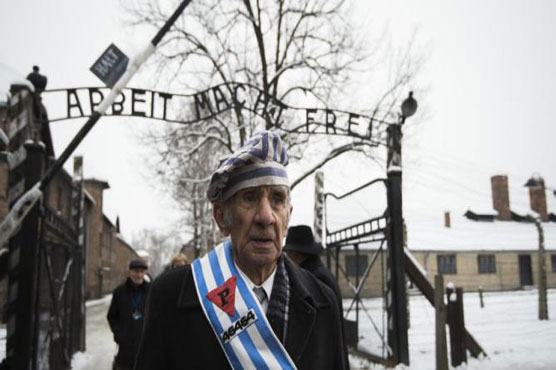Survivors return to Auschwitz as leaders warn of anti-Semitism

The Nazis killed six million of pre-war Europe's 11 million Jews.
OSWIECIM (AFP) - Elderly Holocaust survivors returned to the infamous Auschwitz-Birkenau death camp Tuesday, 70 years after it was liberated, to bear witness to one of history s worst atrocities for what may be their last time - and urge the world never to forget.
Around 300 survivors, some of them wearing scarves in the blue-and-white stripes of their camp uniforms, joined world leaders for an emotional memorial at the epicentre of the Nazi genocide of European Jews.
The memorial at the austere camp, which was blanketed in snow, comes amidst growing concern over a resurgence in anti-Semitism in France, Germany and other parts of Europe.
"We do not want our past to be our children s future," survivor Roman Kent, 86, said, his voice breaking with emotion.
"Witnessing the atrocities committed at the entrance gate of Auschwitz was enough to keep me awake until the end of time," Kent said.
"Even 70 years later the cruelty at the camp is indelibly etched in my mind...How can I ever forget the smell of burning flesh that permeated the air?"
"We are in a place where civilisation collapsed," Polish President Bronislaw Komorowski told those gathered as he paid respect to the Soviet Red Army troops who liberated the camps.
The mournful wail of the "shofar" -- a traditional Jewish ram s horn symbolising freedom -- rang out as participants prayed for the victims at ceremonies next to the camp s red-brick entrance and railway lines leading to its infamous gas chambers.
As night fell, dignitaries and survivors walked down the railway, in the shadows of the barbed-wire fence, to lay wreaths and candles at a memorial.
"I thought I would be incinerated here, never to experience my first kiss, but somehow, a 14-year-old girl, I survived," Halina Birenbaum, 86, told the hundreds of dignitaries and fellow survivors, mostly in their eighties and nineties.
The grandson of the infamous Auschwitz commander Rudolf Hoess was among the attendees.
"I can t forgive my father or my grandfather. I m completely different," Rainer Hoess, who is devoted to fighting anti-Semitism, told reporters as he visited Auschwitz.
Never to forget
Earlier Tuesday, French President Francois Hollande and his Czech counterpart echoed warnings by a leading Jewish organisation, German Chancellor Angela Merkel and Hollywood mogul Steven Spielberg over violence against Jews in modern-day Europe.
Telling French Jews that "France is your homeland," Hollande, who later attended the memorial at Auschwitz, described as "unbearable" the rise in anti-Semitic attacks in France, underscored by the Islamist killings at a kosher supermarket in Paris earlier this month.
Anti-Semitic acts in France, home to Europe s largest Jewish population, doubled in 2014 to 851 from the previous year, France s main Jewish group CRIF said Tuesday.
The European Jewish Congress chief Moshe Kantor warned that Europe is "close to" a new exodus of Jews, saying "jihadism is very close to Nazism".
Merkel said it was a "disgrace" that Jews in Germany faced insults, threats and violence, as she joined survivors in Berlin on Monday.
US President Barack Obama pledged in a statement Tuesday "never to forget" those murdered by the Nazi regime and voiced concerns over anti-Semitism.
The Middle East problem
German President Joachim Gauck and Ukraine President Petro Poroshenko and a host of other leaders attended Tuesday s memorial, but Russia, the United States and Israel sent lower-ranking representatives.
Celina Biniaz was among the 1,200 Jews who escaped Auschwitz by being placed on Oskar Schindler s famous list.
Still elegant at 83, as a child she left the death camp to work in a nearby factory run by the German industrialist.
"I so wish they would settle that problem in the Middle East because I so believe that it has a definite impact on what s happening with anti-Semitism all over Europe," Biniaz, who came from California for the ceremonies, told AFP.
Allies knew in 1942
Part of Adolf Hitler s genocide plan against European Jews, dubbed the "Final Solution", Auschwitz-Birkenau operated in the occupied southern Polish town of Oswiecim between June 1940 and January 1945.
Of the more than 1.3 million people imprisoned there, some 1.1 million -- mainly European Jews -- perished, either in the gas chambers or by starvation or disease.
The Nazis killed six million of pre-war Europe s 11 million Jews.
Historical records show that by 1942, the Polish resistance provided Allied powers with eyewitness accounts of the Holocaust. Inexplicably, Washington and London failed to act.
"The debate as to why the Allies did not bomb the supply lines to Auschwitz remains unresolved," survivor Marcel Tuchman told AFP.
"Whether there was a sinister reason behind it or whether it was just tactical, in that they didn t want to divert their air force remains unclear," the 93-year-old said.
"A little bomb in the proper place would have really helped."

